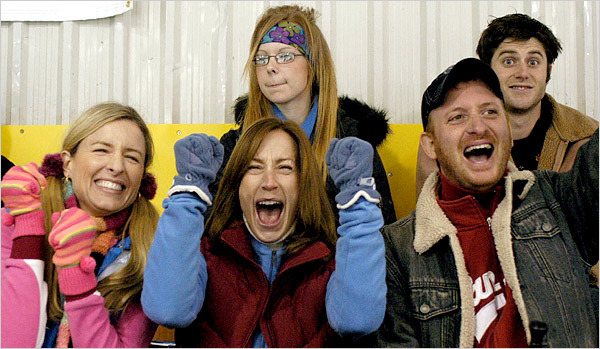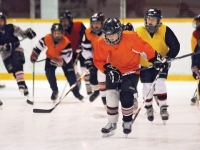Having a child that plays hockey is a big commitment. Practices, games, and not to mention tournaments, some of which can be far away. Registration fees and gear also cost a pretty penny, and watching your child play can be stressful. You’re worried about them performing well, about whether they’re having fun, and about their safety.
These things bring an important question that comes up for many of us in the world of hockey: Are parents too invested in their child’s hockey? To properly answer this, we should consider three forms of “investment”: financial, emotional, and time.
Financial Investment
Depending on the skill level and area, paying for a child to play minor hockey for one season can cost anywhere from $1,000 – $10,000, including registration fees, game fees, and equipment costs. This means that, to have a child play hockey for ten years, their parents can be paying up to $100,000 to fund it! Of course, this is an extreme case where the registration fees are ridiculously expensive, and your child is taking very poor care of their equipment (or growing way too much every year). But you get the point, this is an enormous sum of money for a child to be able to play a recreational sport, but countless parents shell out the money nonetheless, and are happy doing it. And just remember, some even have more than 1 hockey player in the family!
Time Investment
To gain a clear understanding of exactly how much time having a child that plays hockey can take from a parent’s week, let’s consider Robert, proud father of 13-year-old hockey player, Jake. Every week, Robert takes Jake to one practice and one game, which take approximately two hours each considering the drive-time. But since Jake is so driven to be the best he can be, Robert also takes Jake to lessons with a personal hockey trainer on the side, which is another two and a half hours out of his week.
If we also consider trips to purchase gear and spending full nights away from home for tournaments that are far away, Robert can be spending upwards of 40 hours a month dedicated to Jake playing hockey. And certainly, this example is not far off from the amount of time that most hockey parents dedicate to their hockey-playing children.
Emotional Investment
Everyone wants to see their child succeed and be happy, and that is certainly no different for parents who have children that play hockey. Every hockey parent worries about their child’s safety while playing. This includes their mental and emotional well-being, i.e. whether they are accepted by the other members of their team, and if they’re making enough friends on the team.
And to different degrees, hockey parents also worry about whether their child is truly enjoying themselves while playing the sport, and that they’re happy with their performance in the games. As well, many of the parents also have an innate love for the sport, they may have played it as a child or had always wanted to play but never got the opportunity; so there is a significant amount of emotional investment there, as well.
To determine if you’re too invested in your child’s hockey career, first, think about the three areas mentioned above and place a solid guess on exactly how invested you are. Next, consider the following things:
1) How much your child is enjoying playing hockey
If your child tries to make excuses for missing practices or games, complains when they end up going to them, or just generally seems disinterested in the sport, then it might be time to make a change (next season). Explain that they need to fulfil this year’s commitment, but perhaps change to a different sport or activity next time around, which in turn may save money and time.
2) How much you’re enjoying seeing your child play hockey
Being happy because your child is enjoying themselves and having fun is awesome, but achieving your own sports dreams through the actions of your child should be carefully considered. It may lead to the realization that your child truly doesn’t enjoy playing hockey, but is only sticking with it because they are feeling pressured. In this case, it might be time to consider the first point again, or at least attempt to decrease your emotional investment.
3) How much you think your child really needs/wants your support
This point is geared more towards those super-involved hockey parents who pace the boards during games and shout at just about anything they can. We all know a parent like that, and if you can’t think of anyone off the top of your head, then maybe it’s you! In a lot of cases, vocal and overly-involved parents can embarrass their child more than displaying the sense of support which they intended. Therefore, this behavior should be carefully checked to make sure that the child is okay with it. If not, then it might be time to really decrease your emotional investment.
The question of whether parents in general are too invested in their child’s hockey is truly an opinion and open to interpretation. But with a bit of self-reflection using the method outlined above, any hockey parent can figure out if they, themselves are too invested and make the appropriate change if needed. In the end, it can go a long way for both their own happiness, and the happiness of their hockey player.






